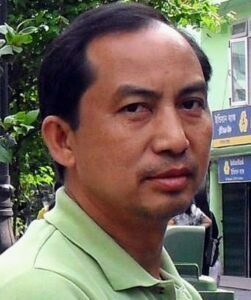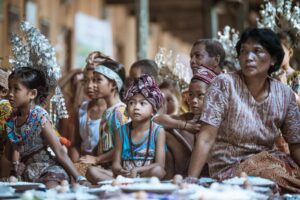The Manipur Government is set to introduce a system that potentially can replace original forests with the highly commercial oil palm plantations – which the Dayak Iban fought vigorously as it was destroying their land and forests. State planners here perhaps can pick a lesson from this humane story of the Sungai Utik people.

By Salam Rajesh
The success story of the 40-year-campaign of the Indigenous Dayak Iban to save their 10,087 hectare customary forest in the Indonesian Borneo sets an exemplary role model of achievement on ground of the targets set at the Paris Climate Summit.
The Indigenous Dayak Iban of Sungai Utik Longhouse had vigorously campaigned for four decades to obtain legal recognition of land rights of their customary forest. By consistently defending its land against illegal logging, palm oil production, and corporate interests, the Dayak Iban has protected a staggering 1.31 million metric tonnes of forest-based carbon – an outstanding contribution to the world’s effort in limiting global temperature rise.
As much as their win is laudable, the Dayak Iban’s lifestyle is equally fascinating. The families of the Dayak Iban group of Sungai Utik community collectively live in a single 216 metre-long traditional longhouse that can accommodate 276 individuals! They live as one group and they fought as one group to save their forest.

Known as the Sungai Utik forest guardians, the Dayak Iban live in West Kalimantan, Indonesia. The Sungai Utik community sustainably manages their forest in accordance with their customary laws, reserving 6000 hectares as protected forest and using 3504 hectares for crop cultivation managed in a traditional rotation system.
An Equator Initiative report (2020) explains that this management system ‘provides the group with food, medicine, and clean water, and while valuing nature and cultural integrity over temporary wealth from the sale of their land, the Dayak Iban illustrates the power of sustainable Indigenous management for climate change mitigation and human well-being’.
For this integrity of working for the protection and long term conservation of a vast spread of significant rainforest, the Dayak Iban of Sungai Utik Longhouse was awarded the prestigious Equator Prize in 2019, bringing their campaign to world attention. The result is that today scientists, researchers, and the curious visitors are making a beeline to see the fascinating longhouse and its conservation champions.
The story, though a happy one today, had its twists and turns through a long process of near about forty years of rigorous campaign to defend their land and forest from the external pressures. The Equator Initiative report profiles the struggle of the Sungai Utik community and their ultimate win, signaling a pathway for many Indigenous peoples fighting on similar grounds to safeguard their “Territories of Life”.
It all began during the year 1999 when the Indonesian Government passed a forestry law that defined customary forests as part of ‘state forests’. The law enabled the Government to ‘grant concessions to private companies for logging and development’, even if the land was customarily protected by Indigenous groups or local communities. The Sungai Utik community fought back to protect their land.
The report states that in 2013, a landmark constitutional court ruling invalidated the 1999 definition of customary forests as state forests. The ruling was significant for the Indigenous Dayak Iban fighting the Government policy for it opened up a pathway to restore the rights of Indigenous peoples and local communities (IPLCs) to their customary forests.
Needless to say, the victory of the Sungai Utik community heralds a turnover in land conflict issues around the world where IPLCs face extreme forms of threat over their lands, forests, and livelihoods due to the intervention of powerful mining companies and industries backed by State.
In India, too, the country is currently facing a similar scenario where the Government of India had proposed amendments to the Forest Conservation Act that have the potential to unleash a massive invasion of the rich and powerful into resource rich lands and forests traditionally managed and controlled by IPLCs. The biologically sensitive hotspots in the Western Ghats, Andaman & Nicobar Islands, and the North East face an uncertain fate if and when the proposed amendments come into effect, allowing companies to make inroads into the bio-sensitive areas.
According to the Centre for International Forest Research (CIFOR), between 1973 and 2010, more than 10 million hectares of forest were lost in Indonesian Borneo, which is locally known as Kalimantan. Successive waves of deforestation had jeopardized habitats of endemic species, including the Bornean orangutan (Pongo pygmaeus) and the helmeted hornbill, both listed as critically endangered on the IUCN Red List. Kalimantan’s natural carbon stores had also diminished as a result of the large scale deforestation.
In early 2020, the Indonesian Ministry of Environment and Forestry issued a decree that formally designated 9,480 hectares of customary forest to the people of Sungai Utik, allowing them to permanently use, manage, and preserve their land. This marked a major milestone in Indigenous customary land rights issue, unique in the world.
The Equator Initiative report gives the thumps-up to the Dayak Iban’s victory, stating that “As forest guardians, the Sungai Utik people stand as a global example of community-based climate mitigation, supporting the implementation of the 2030 Agenda and the Sustainable Development Goals of the United Nations”.
The report further highlights the singular achievement of the win, stating that “Their initiative extends far beyond the goal of climate action (SDG 13). Sustainable forest management contributes to the goals of no poverty (SDG 1), zero hunger (SDG 2), clean water and sanitation (SDG 6), decent work and economic growth (SDG 8), and life on land (SDG 15)”.
Commenting on the significance of the initiative in promoting social justice, the report says, “When the community as a whole earns money, it divides the income among families or invests in resources that benefit the entire community. As well as furthering SDGs 1 and 2, this communal approach to income supports the goal of reduced inequalities (SDG 10). Observing Sungai Utik traditional wisdom, roles in the community are equitably divided between men and women, supporting the goal of gender equality (SDG 5)”.
This, in brief, is the story of a minority group in the vast rainforests of Indonesia, who by their sheer will in fighting back to protect their land and forests for their future generations, have won global acclaim of community-led conservation of precious forest ecosystem that not only sustains their living but also contributes to global concerns on climate change mitigation.
Sadly enough, the Government back home is set to introduce a system that potentially can replace original forests with the highly commercial oil palm plantations – which the Dayak Iban fought vigorously as it was destroying their land and forests. State planners here perhaps can pick a lesson from this humane story of the Sungai Utik people.
The story of the Sungai Utik community also reflects on the decades of struggle of the fishing community thriving upon Loktak Lake in securing their rights to life and resource use. Devastated by State’s frequent interventions in many forms, the Loktak fishers, themselves a minority like the Dayak Iban, faces a larger force that can overcome them unless the community stands strong and united as a single entity, so much as the Sungai Utik community did.
(The writer is a media professional working on environmental issues. He can be reached at [email protected])
